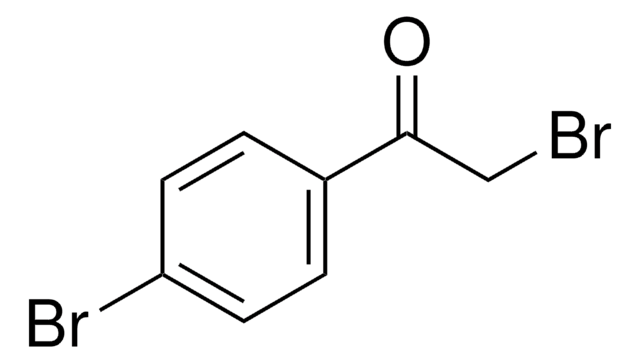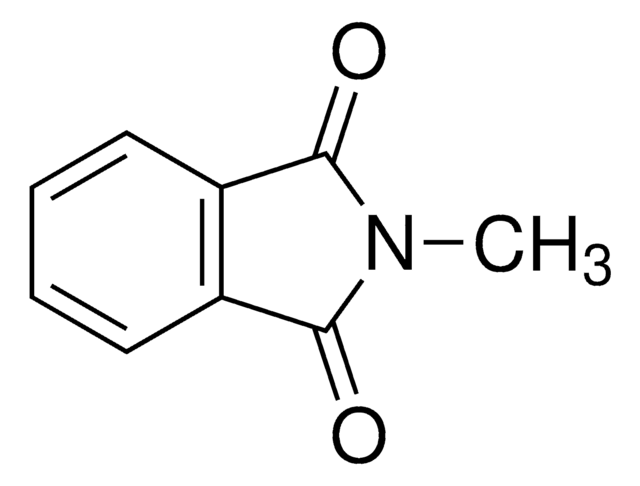68082
2,4′-Dibromoacetophenone
for HPLC derivatization, LiChropur™, ≥99.0% (HPLC)
Synonym(s):
4′-Bromophenacyl bromide
Sign Into View Organizational & Contract Pricing
All Photos(1)
About This Item
Linear Formula:
BrC6H4COCH2Br
CAS Number:
Molecular Weight:
277.94
Beilstein/REAXYS Number:
607604
EC Number:
MDL number:
UNSPSC Code:
12000000
PubChem Substance ID:
NACRES:
NA.22
Recommended Products
grade
derivatization grade ((HPLC))
for HPLC derivatization
Quality Level
assay
≥99.0% (HPLC)
form
solid
quality
LiChropur™
technique(s)
HPLC: suitable
mp
108-110 °C (lit.)
108-112 °C
SMILES string
BrCC(=O)c1ccc(Br)cc1
InChI
1S/C8H6Br2O/c9-5-8(11)6-1-3-7(10)4-2-6/h1-4H,5H2
InChI key
FKJSFKCZZIXQIP-UHFFFAOYSA-N
Looking for similar products? Visit Product Comparison Guide
Application
Derivatisation reagent for HPLC separation of free fatty acids (FFAs) in human plasma, for liquid chromatography-UV-tandem mass spectrometric analysis of perfluorinated carboxylic acids.
Legal Information
LiChropur is a trademark of Merck KGaA, Darmstadt, Germany
signalword
Danger
hcodes
Hazard Classifications
Skin Corr. 1B
Storage Class
8A - Combustible corrosive hazardous materials
wgk_germany
WGK 2
flash_point_f
Not applicable
flash_point_c
Not applicable
Choose from one of the most recent versions:
Already Own This Product?
Find documentation for the products that you have recently purchased in the Document Library.
Customers Also Viewed
A Mehta et al.
Journal of chromatography. B, Biomedical sciences and applications, 719(1-2), 9-23 (1998-12-30)
We report a rapid and sensitive method for separation and quantitation of free fatty acids (FFAs) in human plasma using high-performance liquid chromatography (HPLC). Two established techniques of lipid extraction were investigated and modified to achieve maximal FFA recovery in
Jinxue Qiu et al.
Journal of chromatography. A, 1235, 132-140 (2012-03-10)
The presence of perfluorocarboxylates (PFCAs) in the environment is of increasing concern due to their possible toxicity to humans and bioaccumulation in organisms. PFCAs are frequently found in river water, sediment and organisms and sometimes even in groundwater. In order
Wen-Hsin Liu et al.
Toxicology letters, 185(2), 102-109 (2009-01-03)
In view of the controversial role of catalytic activity on the cytotoxicity of phospholipase A(2) (PLA(2)), the present study is conducted to explore whether PLA(2) induces apoptotic process of human leukemia U937 cells through catalytic activity-independent pathway. Modification of His-48
P S F Barbosa et al.
Toxicon : official journal of the International Society on Toxinology, 46(4), 376-386 (2005-08-24)
Bothrops jararacussu myotoxin I (BthTx-I; Lys 49) and II (BthTX-II; Asp 49) were purified by ion-exchange chromatography and reverse phase HPLC. In this work we used the isolated perfused rat kidney method to evaluate the renal effects of B. jararacussu
Sanjaya Kuruppu et al.
The Journal of pharmacology and experimental therapeutics, 315(3), 1196-1202 (2005-09-02)
The Papuan taipan (Oxyuranus scutellatus canni) is widely distributed throughout much of Papua New Guinea. Although neurotoxicity is a major symptom of envenomation, no neurotoxins have been isolated from this venom. Using a series of size exclusion chromatography steps, we
Our team of scientists has experience in all areas of research including Life Science, Material Science, Chemical Synthesis, Chromatography, Analytical and many others.
Contact Technical Service









